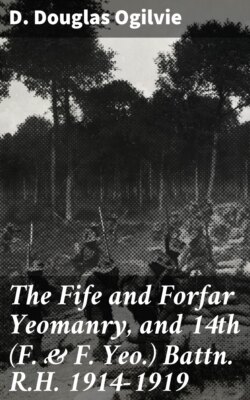Читать книгу The Fife and Forfar Yeomanry, and 14th (F. & F. Yeo.) Battn. R.H. 1914-1919 - D. Douglas Ogilvie - Страница 3
На сайте Литреса книга снята с продажи.
FOREWORD
ОглавлениеTable of Contents
Major Ogilvie has done me the honour of asking me to write a short preface to a work which to me is of peculiar interest.
To write a preface—and especially a short one—is a somewhat difficult task, but my intense pride in, and admiration for, the part played by the Battalion with which the gallant author was so long and honourably associated must be my excuse for undertaking to do my best.
From his stout record as a soldier the author's qualifications to write this history are undoubted. His readers will be able to follow from start to glorious finish of the Great War the fortunes of that gallant little band of Fife and Forfar Yeomen who ultimately became the 14th (Fife and Forfar Yeomanry) Battalion The Royal Highlanders.
There was little of moment in the operations of the Egyptian Expeditionary Force in which this unit did not take part. In divers theatres of war they answered the call of Empire—from Gallipoli to Jerusalem, from Jerusalem to France—ever upholding the honour of their King and Country and the best traditions of the British Army.
No matter what by-path of the Great War they trod they bore themselves with the undaunted spirit of their forefathers.
The experiences of the Battalion were so full of interest as to seem well worth placing on record—quite apart from the military importance of the operations in which they were concerned.
The ordinary reader must consider the conditions under which the work of this unit was carried out—often under a burning sun and again in bitter cold, mud and torrential rain—conditions which might well appal the stoutest heart, but here I note that the gallant author, as I expected, makes light of the many hardships and vicissitudes that he and his comrades were called upon to endure.
Again, when we consider how these heroes first entered the lists as cavalry, were then called upon to serve as dismounted cavalry, and finally as infantrymen, it surely speaks highly for that "will to win" that they had not long before the cessation of hostilities died of a broken heart!
Many a time during the two years that I had the honour to command the 74th (Yeomanry) Division both in Palestine and France, I noted—not without a feeling of intense pride—the cheery "never-say-die" spirit which pervaded all ranks of this splendid Battalion.
No matter what task was set them—no matter what the difficulties and privations to be encountered—all was overcome by that unfaltering determination and unswerving loyalty which carried them triumphant wherever the fates called them.
In conclusion of these few poor remarks of mine, let me congratulate the author on his story. If others read it with the same interest and enjoyment with which it has filled me, I can only think that the author's labours have not been in vain.
Further, may these remarks go forth, not only as a token to my old friends of the 14th Battalion The Royal Highlanders, of the admiration, affection, and gratitude of their old Commander, but to the whole of Scotland as a tribute to the memory of those good and gallant comrades of the "Broken Spur" whom we left behind in foreign lands.
ERIC S. GIRDWOOD,
(late) Major-General, Commanding 74th (Yeomanry) Division.
Portsmouth,
20th August 1921.
